formerly eScholarship Editions


|
|
|
|
Your request for similar items found 20 book(s). | Modify Search | Displaying 1 - 20 of 20 book(s) | |
| 1. | 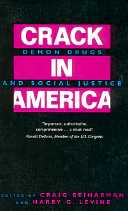 | Title: Crack in America: demon drugs and social justice Author: Reinarman, Craig Published: University of California Press, 1997 Subjects: American Studies | Sociology | Urban Studies Publisher's Description: Crack in America is the definitive book on crack cocaine. In reinterpreting the crack story, it offers new understandings of both drug addiction and drug prohibition. It shows how crack use arose in the face of growing unemployment, poverty, racism, and shrinking social services. It places crack in its historical context - as the latest in a long line of demonized drugs - and it examines the crack scare as a phenomenon in its own right. Most important, it uses crack and the crack scare as windows onto America's larger drug and drug policy problems.Written by a team of veteran drug researchers in medicine, law, and the social sciences, this book provides the most comprehensive, penetrating, and original analysis of the crack problem to date. It reviews the social pharmacology of crack and offers rich ethnographic case studies of crack binging, addiction, and sales. It explores crack's different impacts on whites, blacks, the middle class, and the poor, and explains why crack was always much less of a problem in other countries such as Canada, Australia, and The Netherlands. Crack in America helps readers understand why the United States has the most repressive, expensive, and yet least effective drug policy in the Western world. It discusses the ways politicians and the media generated the crack scare as the centerpiece of the War on Drugs. It catalogues the costs of the War on Drugs for civil liberties, situates crack use and sales in the political economy of the inner cities in the 1980s, and shows how the drug war led to the most massive wave of imprisonment in U.S. history. Finally, it explains why the failures of drug prohibition have led to the emergence of the harm reduction movement and other opposition forces that are changing the face of U.S. drug policy. [brief] Similar Items |
| 2. | 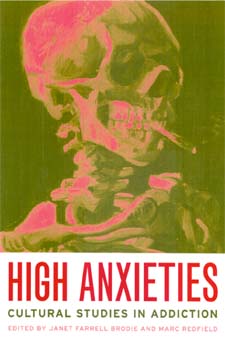 | Title: High anxieties: cultural studies in addiction Author: Brodie, Janet Farrell Published: University of California Press, 2002 Subjects: Literature | Media Studies | Gender Studies | Cognitive Science | Social and Political Thought | Art | Sociology Publisher's Description: High Anxieties explores the history and ideological ramifications of the modern concept of addiction. Little more than a century old, the notions of "addict" as an identity and "addiction" as a disease of the will form part of the story of modernity. What is addiction? This collection of essays illuminates and refashions the term, delivering a complex and mature understanding of addiction. Brodie and Redfield's introduction provides a roadmap for readers and situates the fascinating essays within a larger, interdisciplinary framework. Stacey Margolis and Timothy Melley's pieces grapple with the psychology of addiction. Cannon Schmitt and Marty Roth delve into the relationship between opium and the British Empire's campaign to control and stigmatize China. Robyn R. Warhol and Nicholas O. Warner examine accounts of alcohol abuse in texts as disparate as Victorian novels, Alcoholics Anonymous literature, and James Fenimore Cooper's fiction. Helen Keane scrutinizes smoking, and Maurizio Viano turns to the silver screen to trace how the representation of drugs in films has changed over time. Ann Weinstone and Marguerite Waller's essays on addiction and cyberspace cap this impressive anthology. [brief] Similar Items |
| 3. | 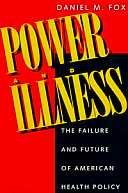 | Title: Power and illness: the failure and future of American health policy Author: Fox, Daniel M Published: University of California Press, 1993 Subjects: Sociology | Medicine | History | American Studies | United States History Publisher's Description: During most of this century, American health policy has emphasized caring for acute conditions rather than preventing and managing chronic illness - even though chronic illness has caused most sickness and death since the 1920s. In this provocative and wide-ranging book, Daniel Fox explains why this has been so and offers a forceful argument for fundamental change in national health care priorities.Fox discusses how ideas about illness and health care, as well as the power of special interest groups, have shaped the ways in which Americans have treated illness. Those who make health policy decisions have increased support for hospitals, physicians, and medical research, believing that people then would become healthier. This position, implemented at considerable cost, has not adequately taken into account the growing burden of chronic disabling illness. While decision makers may have defined chronic disease as a high priority in research, they have not given it such a priority in the financing of health services.The increasing burden of chronic illness is critical. Fox suggests ways to solve this problem without increasing the already high cost of health care - but he does not underestimate the difficulties in such a strategy. Advocating the redistribution of resources within hospital and medical services, he targets those that are redundant or marginally effective.There could be no more timely subject today than American health care. And Daniel Fox is uniquely able to address its problems. A historian of medicine, with knowledge of how hospitals and physicians behave and how health policy is made at government levels, he has extensively researched published and unpublished documents on health care. What he proposes could profoundly affect all Americans. [brief] Similar Items |
| 4. | 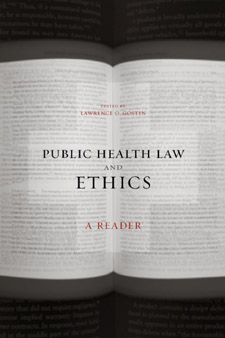 | Title: Public health law and ethics: a reader Author: Gostin, Larry O. (Larry Ogalthorpe) Published: University of California Press, 2002 Subjects: Law | Medicine | Health Care Publisher's Description: This incisive selection of government reports, scholarly articles, and court cases is designed to illuminate the ethical, legal, and political issues in the theory and practice of public health. A companion to the internationally acclaimed Public Health Law: Power, Duty, Restraint, this collection encourages debate and discourse about how courts, scholars, and policy makers respond to the salient legal and ethical dilemmas. The excerpts and commentaries in the reader analyze the legal and constitutional foundations of public health, juxtaposing them with the emerging importance of public health ethics and human rights. The book offers a systematic account of public health law, ethics, and human rights in promoting the common good. Gostin provides thoughtful commentary on the field of public health and carefully explains the meaning and importance of each selection. Scholars, legislators, and public health professionals, as well as faculty and students in schools of law, public health, medicine, nursing, government, and health administration, will benefit from the contemporary case studies covering a wide range of topics from bioterrorism to public health genetics. [brief] Similar Items |
| 5. |  | Title: Deceit and denial: the deadly politics of industrial pollution Author: Markowitz, Gerald E Published: University of California Press, 2002 Subjects: Medicine | Health Care | Public Policy | United States History Publisher's Description: Deceit and Denial details the attempts by the chemical and lead industries to deceive Americans about the dangers that their deadly products present to workers, the public, and consumers. Gerald Markowitz and David Rosner pursued evidence steadily and relentlessly, interviewed the important players, investigated untapped sources, and uncovered a bruising story of cynical and cruel disregard for health and human rights. This resulting exposé is full of startling revelations, provocative arguments, and disturbing conclusions--all based on remarkable research and information gleaned from secret industry documents. This book reveals for the first time the public relations campaign that the lead industry undertook to convince Americans to use its deadly product to paint walls, toys, furniture, and other objects in America's homes, despite a wealth of information that children were at risk for serious brain damage and death from ingesting this poison. This book highlights the immediate dangers ordinary citizens face because of the relentless failure of industrial polluters to warn, inform, and protect their workers and neighbors. It offers a historical analysis of how corporate control over scientific research has undermined the process of proving the links between toxic chemicals and disease. The authors also describe the wisdom, courage, and determination of workers and community members who continue to voice their concerns in spite of vicious opposition. Readable, pathbreaking, and revelatory, Deceit and Denial provides crucial answers to questions of dangerous environmental degradation, escalating corporate greed, and governmental disregard for its citizens' safety and health. [brief] Similar Items |
| 6. |  | Title: Policies, plans, & people: foreign aid and health development Author: Justice, Judith Published: University of California Press, 1989 Subjects: Anthropology | Art and Architecture Publisher's Description: Judith Justice uses an interdisciplinary approach to show how anthropologists and planners can combine their expertise to make health care programs culturally compatible with the populations they serve. Similar Items |
| 7. | 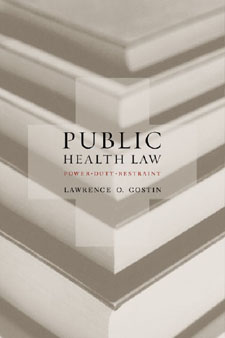 | Title: Public health law: power, duty, restraint Author: Gostin, Larry O. (Larry Ogalthorpe) Published: University of California Press, 2001 Subjects: Law | Medicine | Public Policy Publisher's Description: Gostin's timely book offers the first systematic definition and theory of public health law. Basing his definition on a broad notion of the government's inherent responsibility to advance the population's health and well-being, he develops a rich understanding of the government's fundamental powers and duties. By analyzing constitutional powers and limits, as well as statutory, administrative, and tort law, Public Health Law vividly shows how law can become a potent tool for the realization of a healthier and safer population. [brief] Similar Items |
| 8. | 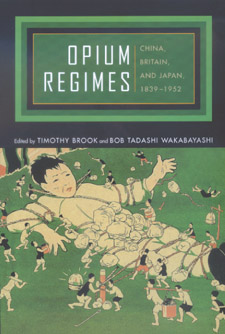 | Title: Opium regimes: China, Britain, and Japan, 1839-1952 Author: Brook, Timothy 1951- Published: University of California Press, 2000 Subjects: History | China | Asian History Publisher's Description: Opium is more than just a drug extracted from poppies. Over the past two centuries it has been a palliative medicine, an addictive substance, a powerful mechanism for concentrating and transferring wealth and power between nations, and the anchor for a now vanished sociocultural world in and around China. Opium Regimes integrates the pioneering research of sixteen scholars to show that the opium trade was not purely a British operation but involved Chinese merchants, Chinese state agents, and Japanese imperialists as well. The book presents a coherent historical arc that moves from British imperialism in the nineteenth century, to Chinese capital formation and state making at the turn of the century, to Japanese imperialism through the 1930s and 1940s, and finally to the apparent resolution of China's opium problem in the early 1950s. Together these essays show that the complex interweaving of commodity trading, addiction, and state intervention in opium's history refigured the historical face of East Asia more profoundly than any other commodity. [brief] Similar Items |
| 9. |  | Title: Lives at risk: public health in nineteenth-century Egypt Author: Kuhnke, LaVerne Published: University of California Press, 1990 Subjects: Anthropology | Medical Anthropology Publisher's Description: Lives at Risk describes the introduction of Western medicine into Egypt. The two major innovations undertaken by Muhammad Ali in the mid-nineteenth century were a Western-style school of medicine and an international Quarantine Board. The ways in which these institutions succeeded and failed will greatly interest historians of medicine and of modern Egypt. And because the author relates her narrative to twentieth-century health issues in developing countries, Lives at Risk will also interest medical and social anthropologists.The presence of the quarantine establishment and the medical school in Egypt resulted in a rudimentary public health service. Paramedical personnel were trained to provide primary health care for the peasant population. A vaccination program effectively freed the nation from smallpox. But the disease-oriented, individual-care practice of medicine derived from the urban hospital model of industrializing Europe was totally incompatible with the health care requirements of a largely rural, agrarian population. [brief] Similar Items |
| 10. | 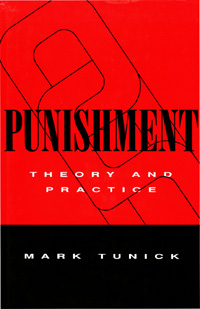 | Title: Punishment: theory and practice Author: Tunick, Mark Published: University of California Press, 1992 Subjects: Politics | Political Theory | Social and Political Thought | Law Publisher's Description: What actions should be punished? Should plea-bargaining be allowed? How should sentencing be determined? In this original, penetrating study, Mark Tunick explores not only why society punishes wrongdoing, but also how it implements punishment.Contending that the theory and practice of punishment are inherently linked, Tunick draws on a broad range of thinkers, from the radical criticisms of Nietzsche, Foucault, and some Marxist theorists through the sociological theories of Durkheim and Girard to various philosophical traditions and the "law and economics" movement. He defends punishment against its radical critics and offers a version of retribution, distinct from revenge, that holds that we punish not to deter or reform, but to mete out just deserts, vindicate right, and express society's righteous anger. Demonstrating first how this theory best accounts for how punishment is carried out, he then provides "immanent criticism" of certain features of our practice that don't accord with the retributive principle.Thought-provoking and deftly argued, Punishment will garner attention and spark debate among political theorists, philosophers, legal scholars, sociologists, and criminologists. [brief] Similar Items |
| 11. | 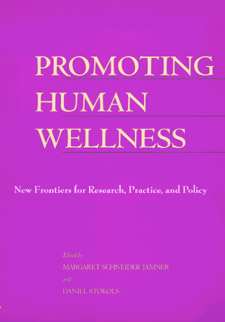 | Title: Promoting human wellness: new frontiers for research, practice, and policy Author: Jamner, Margaret Schneider Published: University of California Press, 2001 Subjects: Medicine | Public Policy | Anthropology | Aging | Education Publisher's Description: This book is a state-of-the-art educational resource on the latest research and public-policy developments in the fields of wellness promotion and disease prevention. Based on award-winning lectures by University of California faculty on nine campuses as part of the Wellness Lectures Program jointly funded by The California Wellness Foundation, Health Net, and the University of California, the volume aims to widen the scope of health care research and policy to promote wellness rather than focus on illness and disease, and to incorporate proactive, interdisciplinary approaches to health care. The volume also contains chapters by distinguished scholars inthe fields of wellness promotion and disease prevention. Many of these articles fall outside the scope of what we conventionally call health promotion, bringing new perspectives to research and policy possibilities. Promoting Human Wellness is organized around core themes such as the importance of disease prevention programs that address multiple health risks, the link between poverty and minority status and disease susceptibility, and the challenge of evaluating health benefits and cost-effectiveness. The articles discuss such timely issues as genetic determinism as a paradigm in wellness promotion, adolescent health promotion and teen pregnancy prevention strategies, racial differences in cancer epidemiology, the California smokers' helpline, strategies for reducing youth violence, HIV/AIDS prevention, domestic violence education and prevention srategies, and the future of women's health research. Presented within the framework of social ecology, several of the chapters in this volume address new ideas and approaches in the wellness field that are only now beginning to be understood such as the social construction of variables including race, class, and gender. Promoting Human Wellness will be essential reading for health practitioners, policymakers, and others seeking to expand the ways we define and achieve health. Keywords: Public health, community health, medicine, nursing, social welfare, health education, health psychology, social ecology, public policy, aging, health promotion. [brief] Similar Items |
| 12. |  | Title: Abuses Author: Lingis, Alphonso 1933- Published: University of California Press, 1994 Subjects: Philosophy | Literature | Cultural Anthropology | Social and Political Thought | Psychology | Travel Publisher's Description: Part travelogue, part meditation, Abuses is a bold exploration of central themes in Continental philosophy by one of the most passionate and original thinkers in that tradition writing today.A gripping record of desires, obsessions, bodies, and spaces experienced in distant lands, Alphonso Lingis's book offers no less than a new approach to philosophy - aesthetic and sympathetic - which departs from the phenomenology of Levinas and Merleau-Ponty. "These were letters written to friends," Lingis writes, "from places I found myself for months at a time, about encounters that moved me and troubled me. . . . These writings also became no longer my letters. I found myself only trying to speak for others, others greeted only with passionate kisses of parting."Ranging from the elevated Inca citadel of Machu Picchu, to the living rooms of the Mexican elite, to the streets of Manila, Lingis recounts incidents of state-sponsored violence and the progressive incorporation of third-world peoples into the circuits of exchange of international capitalism. Recalling the work of such writers as Graham Greene, Kathy Acker, and Georges Bataille, Abuses contains impassioned accounts of silence, eros and identity, torture and war, the sublime, lust and joy, and human rituals surrounding carnival and death that occurred during his journeys to India, Bangladesh, Thailand, Bali, the Philippines, Antarctica, and Latin America. A deeply unsettling book by a philosopher of unusual imagination, Abuses will appeal to readers who, like its author, "may want the enigmas and want the discomfiture within oneself." [brief] Similar Items |
| 13. | 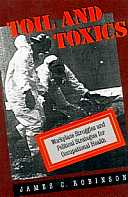 | Title: Toil and toxics: workplace struggles and political strategies for occupational health Author: Robinson, James C. (James Claude) 1953- Published: University of California Press, 1991 Subjects: Environmental Studies | Labor Studies | Sociology | Public Policy | Economics and Business Similar Items |
| 14. | 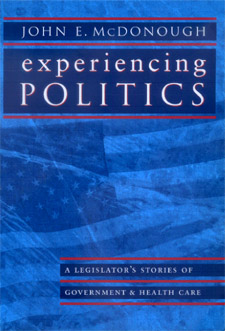 | Title: Experiencing politics: a legislator's stories of government and health care Author: McDonough, John E. (John Edward) Published: University of California Press, 2000 Subjects: Politics | Public Policy | Medicine Publisher's Description: John E. McDonough affords a rare glimpse into the practice of state politics in this insider's account of the fascinating interface between political science and real-life politics. A member of the Massachusetts House of Representatives for thirteen years and a skilled storyteller, McDonough eloquently weaves together stories of politics and policy with engaging theoretical models in a way that illuminates both the theory and the practice. By providing a link between scholarship and the world of experience, he communicates much about the essence of representative democracy. In the process, he demonstrates how politics extend beyond the public sphere into many aspects of life involving diverse values and interests. McDonough describes the nature of conflict, the role of interests, agenda setting, the nature and pace of change, the use of language, and more. Accessible, insightful, and original, his stories touch on a broad range of issues - including health care politics, campaigns, and elections; a street gang called the X-men; the death penalty; campaign finance reform, and tenants versus landlords. To the author, politics is everywhere and political dynamics are universal. While the setting for this book is one legislature, the lessons and insights are intended for everyone. [brief] Similar Items |
| 15. | 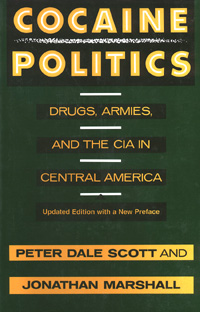 | Title: Cocaine politics: drugs, armies, and the CIA in Central America Author: Scott, Peter Dale Published: University of California Press, 1991 Subjects: Politics | Latin American Studies | Sociology | American Studies | Public Policy Similar Items |
| 16. | 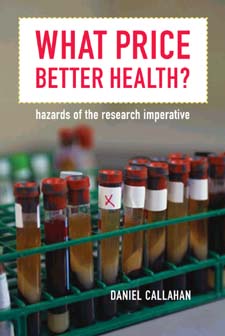 | Title: What price better health?: hazards of the research imperative Author: Callahan, Daniel 1930- Published: University of California Press, 2003 Subjects: Medicine | Philosophy | Public Policy Publisher's Description: The idea that we have an unlimited moral imperative to pursue medical research is deeply rooted in American society and medicine. In this provocative work, Daniel Callahan exposes the ways in which such a seemingly high and humane ideal can be corrupted and distorted into a harmful practice. Medical research, with its power to attract money and political support, and its promise of cures for a wide range of medical burdens, has good and bad sides - which are often indistinguishable. In What Price Better Health?, Callahan teases out the distinctions and differences, revealing the difficulties that result when the research imperative is suffused with excessive zeal, adulterated by the profit motive, or used to justify cutting moral corners. Exploring the National Institutes of Health's annual budget, the inflated estimates of health care cost savings that result from research, the high prices charged by drug companies, the use and misuse of human subjects for medical testing, and the controversies surrounding human cloning and stem cell research, Callahan clarifies the fine line between doing good and doing harm in the name of medical progress. His work shows that medical research must be understood in light of other social and economic needs and how even the research imperative, dedicated to the highest human good, has its limits. [brief] Similar Items |
| 17. | 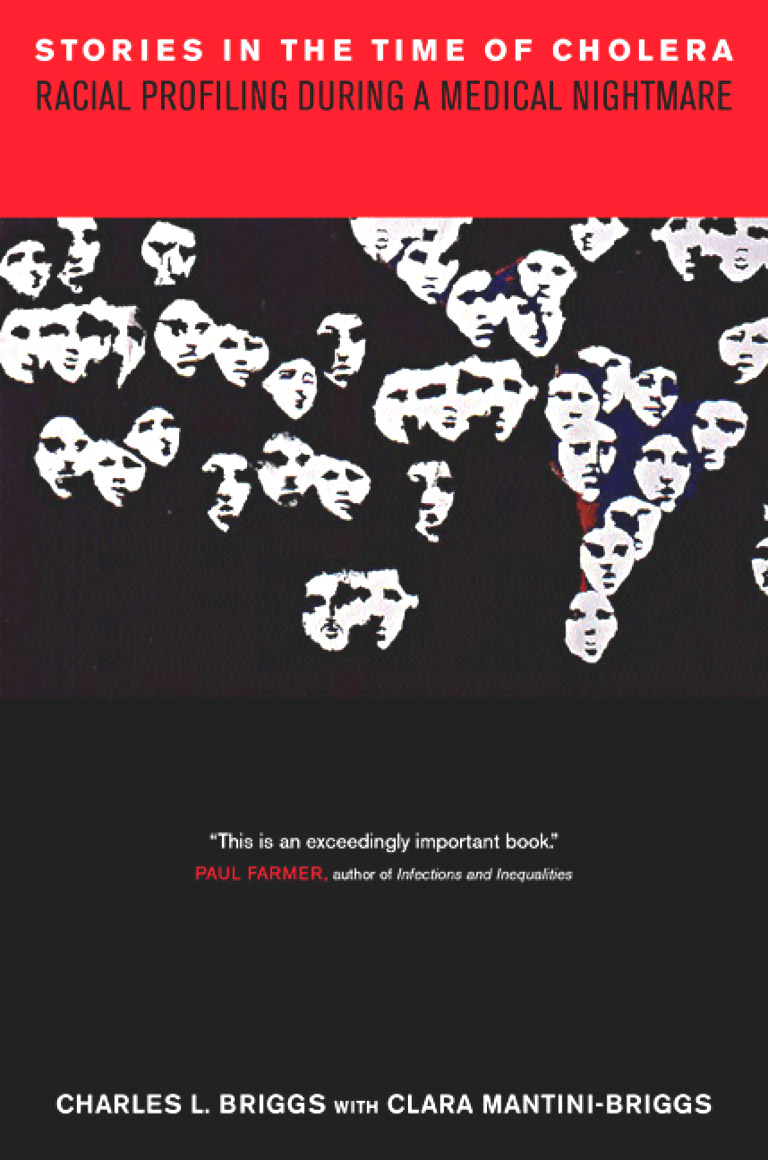 | Title: Stories in the time of cholera: racial profiling during a medical nightmare Author: Briggs, Charles L 1953- Published: University of California Press, 2003 Subjects: Anthropology | Latin American Studies | Ethnic Studies | Disease | Medical Anthropology Publisher's Description: Cholera, although it can kill an adult through dehydration in half a day, is easily treated. Yet in 1992-93, some five hundred people died from cholera in the Orinoco Delta of eastern Venezuela. In some communities, a third of the adults died in a single night, as anthropologist Charles Briggs and Clara Mantini-Briggs, a Venezuelan public health physician, reveal in their frontline report. Why, they ask in this moving and thought-provoking account, did so many die near the end of the twentieth century from a bacterial infection associated with the premodern past? It was evident that the number of deaths resulted not only from inadequacies in medical services but also from the failure of public health officials to inform residents that cholera was likely to arrive. Less evident were the ways that scientists, officials, and politicians connected representations of infectious diseases with images of social inequality. In Venezuela, cholera was racialized as officials used anthropological notions of "culture" in deflecting blame away from their institutions and onto the victims themselves. The disease, the space of the Orinoco Delta, and the "indigenous ethnic group" who suffered cholera all came to seem somehow synonymous. One of the major threats to people's health worldwide is this deadly cycle of passing the blame. Carefully documenting how stigma, stories, and statistics circulate across borders, this first-rate ethnography demonstrates that the process undermines all the efforts of physicians and public health officials and at the same time contributes catastrophically to epidemics not only of cholera but also of tuberculosis, malaria, AIDS, and other killers. The authors have harnessed their own outrage over what took place during the epidemic and its aftermath in order to make clear the political and human stakes involved in the circulation of narratives, resources, and germs. [brief] Similar Items |
| 18. | 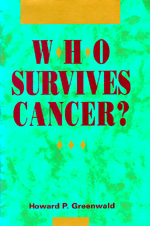 | Title: Who survives cancer? Author: Greenwald, Howard P Published: University of California Press, 1992 Subjects: Sociology | Environmental Studies | Medicine Publisher's Description: FACT OR FICTION? *A white male earning over $35,000 a year has a better chance of surviving most types of cancer than an unemployed African-American male.*Psychological factors predispose people to contracting cancer and improved emotional health promotes recovery.*Early detection is useless in curing cancer.*Experimental, not conventional, treatments offer the most benefits and longer survival rates to cancer patients.*A scientific breakthrough of practical and immediate significance in cancer treatment is imminent.*Cancer prevention is ineffective in many areas and campaigns will probably never achieve a reduction of cancer mortality approaching 50 percent.*Health Maintenance Organizations (HMOs) increase survival chances for most cancer patients.Howard Greenwald takes an incisive new look at how class, race, sex, psychological state, type of health care and available treatments affect one's chance of surviving cancer. Drawing on an original ten-year survival study of cancer patients, he synthesizes medical, epidemiological, and psychosocial research in a uniquely interdisciplinary and eye-opening approach to the question of who survives cancer and why.Scientists, health care professionals, philanthropists, government agencies, and ordinary people all agree that significant resources must be allocated to fight this dreaded disease. But what is the most effective way to do it? Greenwald argues that our priorities have been misplaced and calls for a fundamental rethinking of the way the American medical establishment deals with the disease. He asserts that the emphasis on prevention and experimental therapy has only limited value, whereas the availability of conventional medical care is very important in influencing cancer survival. Class and race become strikingly significant in predicting who has access to health care and can therefore obtain medical treatment in a timely, effective manner. Greenwald counters the popular notion that personality and psychological factors strongly affect survival, and he underscores the importance of early detection. His research shows that Health Maintenance Organizations, while sometimes prone to delays, offer low-income patients a better chance of ultimate survival. Greenwald pleads for immediate attention to the inadequacies and inequalities in our health care delivery system that deter patients from seeking regular medical care.Instead of focusing on research and the hope for a breakthrough cure, Greenwald urges renewed emphasis on ensuring available health care to all Americans. In its challenge to the thrust of much biomedical research and its critique of contemporary American health care, as well as in its fresh and often counterintuitive look at cancer survival, Who Survives Cancer? is invaluable for policymakers, health care professionals, and anyone who has survived or been touched by cancer. [brief] Similar Items |
| 19. | 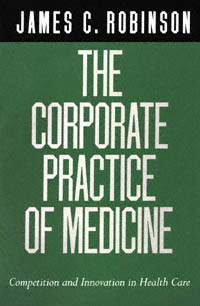 | Title: The corporate practice of medicine: competition and innovation in health care Author: Robinson, James C 1953- Published: University of California Press, 1999 Subjects: Politics | Public Policy | Medicine | Economics and Business Publisher's Description: One of the country's leading health economists presents a provocative analysis of the transformation of American medicine from a system of professional dominance to an industry under corporate control. James Robinson examines the economic and political forces that have eroded the traditional medical system of solo practice and fee-for-service insurance, hindered governmental regulation, and invited the market competition and organizational innovations that now are under way. The trend toward health care corporatization is irreversible, he says, and it parallels analogous trends toward privatization in the world economy.The physician is the key figure in health care, and how physicians are organized is central to the health care system, says Robinson. He focuses on four forms of physician organization to illustrate how external pressures have led to health care innovations: multispecialty medical groups, Independent Practice Associations (IPAs), physician practice management firms, and physician-hospital organizations. These physician organizations have evolved in the past two decades by adopting from the larger corporate sector similar forms of ownership, governance, finance, compensation, and marketing.In applying economic principles to the maelstrom of health care, Robinson highlights the similarities between competition and consolidation in medicine and in other sectors of the economy. He points to hidden costs in fee-for-service medicine - overtreatment, rampant inflation, uncritical professional dominance regarding treatment decisions - factors often overlooked when newer organizational models are criticized.Not everyone will share Robinson's appreciation for market competition and corporate organization in American health care, but he challenges those who would return to the inefficient and inequitable era of medicine from which we've just emerged. Forcefully written and thoroughly documented, The Corporate Practice of Medicine presents a thoughtful - and optimistic - view of a future health care system, one in which physician entrepreneurship is a dynamic component. [brief] Similar Items |
| 20. | 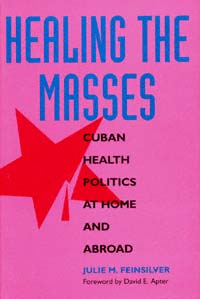 | Title: Healing the masses: Cuban health politics at home and abroad Author: Feinsilver, Julie Margot Published: University of California Press, 1993 Subjects: Latin American Studies | Politics | Medicine | Public Policy Publisher's Description: How has Cuba, a small, developing country, achieved its stunning medical breakthroughs? Hampered by scarce resources and a long-standing U.S. embargo, Cuba nevertheless has managed to provide universal access to health care, comprehensive health education, and advanced technology, even amid desperate economic conditions. Moreover, Cuba has sent disaster relief, donations of medical supplies and technology, and cadres of volunteer doctors throughout the world, emerging, in Castro's phrase, as a "world medical power."In her significant and timely study, Julie Feinsilver explores the Cuban medical phenomenon, examining how a governmental obsession with health has reaped medical and political benefits at home and abroad. As a result of Cuba's forward strides in health care, infant mortality rates are low even by First World standards. Cuba has successfully dealt with the AIDS epidemic in a manner that has aroused controversy and that some claim has infringed on individual liberties - issues that Feinsilver succinctly evaluates.Feinsilver's research and travel in Cuba over many years give her a unique perspective on the challenges Cuba faces in this time of unprecedented economic and political uncertainty. Her book is a must-read for everyone concerned with health policy, international relations, and Third World societies. [brief] Similar Items |